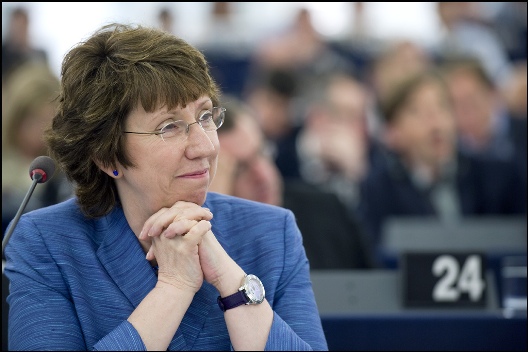 The European Union (EU) has been heavily engaged in ongoing events in Egypt over the past few months. As political unrest has prevailed, several EU officials visited Egypt to meet with government representatives, both of the current and former regimes, as well as party officials from across the political spectrum. The most notable EU official to visit Egypt in the wake of former President Mohamed Morsi’s ouster is Catherine Ashton. During her first visit, the EU’s High Representative for Foreign Affairs and Security Policy, visited former President Mohamed Morsi in an undisclosed detention location in late July in an attempt to resolve the current unrest prevailing in Egypt. She recently embarked on her third visit to Cairo in early October.
The European Union (EU) has been heavily engaged in ongoing events in Egypt over the past few months. As political unrest has prevailed, several EU officials visited Egypt to meet with government representatives, both of the current and former regimes, as well as party officials from across the political spectrum. The most notable EU official to visit Egypt in the wake of former President Mohamed Morsi’s ouster is Catherine Ashton. During her first visit, the EU’s High Representative for Foreign Affairs and Security Policy, visited former President Mohamed Morsi in an undisclosed detention location in late July in an attempt to resolve the current unrest prevailing in Egypt. She recently embarked on her third visit to Cairo in early October.
During her latest visit, she met with several government officials and religious and political figures, as well as leading figures from the Muslim Brotherhood’s Freedom and Justice Party (FJP). This proactive role highlights the EU’s increased interest in Egypt’s state of affairs, a shift that is welcomed by Muslim Brotherhood and FJP figures, who appear accepting of her mediation efforts hoping that such efforts would rescue their political future.
A closer look at the EU’s previous stance on Egypt provides a rational explanation for their current attitude, and also gives a glimpse into what the EU’s future role in Egypt may be.
With the outbreak of the January 25 revolution erupted in Egypt in 2011, and similar movements in the region, the EU failed predict the emergence of these sweeping movements. It also failed to respond to their rapid transformations taking place in Egypt, and beyond, promptly or adequately. The EU’s failure to adopt a common stance regarding the future of the Mubarak regime highlighted the shortcomings of its Common Foreign and Security Policy (CFSP)[nm1] , a framework aiming to unify the foreign and security policies of EU member states and to foster the union’s influence as an international actor. Accordingly, the EU needed a better framework to manage the Arab Spring uprisings that emerged in several Arab states.
In March 2011, the EU established The Partnership for Democracy and Shared Prosperity with the Southern Mediterranean[nm2] , a new strategic response to the Arab Spring revolutions that adopts a “more for more” approach”- meaning that the EU provides Arab Spring countries with more assistance, provided they commit to genuine democratization reforms in justice, good governance, and rule of law.
Under the new partnership, the EU affirmed its support for demands in the Arab Spring countries for political participation, freedom, and employment opportunities. Furthermore, the European Commission stated that the EU is committed to help the Arab states in addressing two main challenges: building deep democracy and achieving sustainable economic growth. In order to achieve those aims, the EU adopted a three-tool strategy focusing on money, mobility, and markets; also referred to as the “3Ms strategy.” However, the strategy was purely economic, focusing solely on financial aid, access to EU markets, and increased mobility for citizens of these countries in the EU. The strategy ignored the importance of political and diplomatic tools, and failed to achieve its aims as none of the Arab spring states have showed any indicators of achieving a genuine democracy or sustainable economic growth.
In response to the failure of this strategy, the EU started to reinforce its diplomatic efforts, with several of its top officials visiting Egypt as well as other Arab Spring states in attempts to stabilize the region and help its polarized parties reach consensus on controversial issues.
Regardless of the outcome of its efforts, the EU’s persistence to engage in the state of affairs of Arab Spring states, especially Egypt, has its rational reasons.
Realistically speaking, the EU cannot be separated from what is going on in Egypt or in the other Arab Spring states, as they are its southern neighbors. This means that the continuity of the current political, economic, and security unrest in the southern Mediterranean states would directly affect the EU. This can be seen in a possible increase in rates of illegal migration from the southern Mediterranean states into the EU borders, a fear which was expressed by NATO Secretary General Anders Fogh Rasmussen as early as July 2011.This concern can potentially impact the EU states negatively, opening the door to national security or economic woes.
The EU, however, finds itself in a precarious position. While exploring options on how to respond in the wake of the violent dispersal of pro-Morsi sit-ins in mid-August that left hundreds dead, the EU’s foreign ministers were also aware of limitations on their leverage. Reluctant to condition5 billion euros in financial aid pledged to Egypt, the EU opted instead to suspend arms sales to Egypt, and to continue providing humanitarian assistance. While UK foreign secretary William Hague tied the decision to fostering democracy among Egyptians, EU’s own sovereign and security concerns are very much at play.
A stable southern Mediterranean would not only be better for security concerns, it would also allow for more economic cooperation with the EU, and opens up a large market to receive more EU investments and products on its southern periphery.
Fady Salah is an Egyptian writer, journalist, political analyst, and author.
Image: Photo: European Parliament
